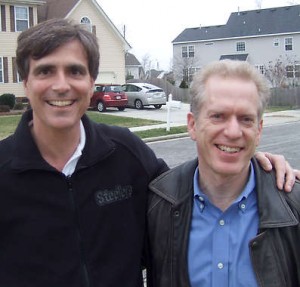By Mike Leonard H-T Columnist
Courtesy HeraldTimesOnline.com 2012
February 13, 2012
 The last time I saw Jeff Zaslow was in June at the annual conference of the National Society of Newspaper Columnists in Detroit.
The last time I saw Jeff Zaslow was in June at the annual conference of the National Society of Newspaper Columnists in Detroit.
As soon as we made eye contact, he walked over and delivered an aw-shucks apology. He said he felt bad about breezing in and out of Bloomington on many occasions and not giving me a call or an invitation to grab a cup of coffee.
“My time with my daughters is precious, you know,” he explained. “I just try to maximize every minute before I have to hit the road.”
I told him, yeah, it would be nice to chat and catch up now and then, but there’s no way I can feel slighted. I said I understood completely.
It’s not like we were best buddies. But we were friends and colleagues for more than a decade, initially through the columnists’ association, in which we were both members of the board of directors at one point, and then later by virtue of his interest in Bloomington because of daughters Jordan, now an Indiana University graduate, and Alex, a current student.
His death last Friday in a car accident in northern Michigan hit me unusually hard, because of that friendship and especially because of those daughters he loved so much.
I doubt that anyone who ever met Zazz didn’t walk away liking him. He was friendly, down-to-earth, self-deprecating and unchanged by the fame and stature that came his way. His first brush with national celebrity came when he almost jokingly applied for and won the job to replace advice columnist Ann Landers when she left the Chicago Sun-Times for the rival Tribune. “I’m 28 but I have the wisdom of a 29-year-old,” he joked to the New York Times.
He did that job for several years, but it really wasn’t his calling. He transitioned quite nicely to a columnist for the Wall Street Journal, writing a column called “Moving On” that focused on the dignity, struggles and fortitude of working men and women. That was more in his wheelhouse.
And that led to the event that truly changed his life — the tip that he might find a terminally ill professor’s last lecture at his alma mater interesting. So he jumped into his car and hit the road from his suburban Detroit home for Carnegie Mellon University in Pittsburgh and the now-famous lecture by 46-year-old computer science professor Randy Pausch.

- Jeff Zaslow, right, who died Friday in an accident in Michigan, is shown with the late Randy Pausch. Zaslow’s funeral is today. Courtesy photo
His Journal column about Pausch’s astonishingly wise and inspirational speech became an overnight sensation and turned into a book that sold more than 5 million copies. It was heady stuff, but the one thing Zaslow took away from the collaboration, he would say over and over, was Pausch’s advice to get his own priorities in order. “Stop Googling my name and go hug your kids,” he recalled Pausch telling him in a column I wrote after an interview in August 2008.
Looking back, the books Zaslow would go on to write all seem to circle back to the lesson so demonstrably illustrated by “The Last Lecture” — that life is short but relationships are enduring, and neither and nothing should be taken for granted.
His “Girls From Ames” chronicled the lives of 11 childhood friends who grew up in Iowa and retained a bond of friendship through the years. He worked with Capt. Chesley “Sully” Sullenberger to write “Highest Duty” after the US Airways pilot successfully landed a disabled airliner filled with passengers in the narrow channel of New York’s Hudson River.
He was so good at these collaborations that after former Arizona congresswoman Gabrielle Giffords had recovered sufficiently from the bullet wound she took to the head in an assassination attempt, he was chosen to work with Giffords and her husband on the recently published book, “Gabby: A Story of Courage and Hope.”
In Detroit last summer, Zaslow sought me out several times to continue the conversation on the missing IU student, Lauren Spierer. He wanted to know what our paper did and didn’t do in its investigation and coverage of the Spierer’s disappearance, whether police investigators were as diligent in the early going as they should have been and what I thought might have happened. Did I know something he hadn’t heard?
Zaslow was a great reporter and writer because he was endlessly curious. But there was also a closeness to the Spierer case that he couldn’t shake. I remember sitting down with Zaslow and his wife, Detroit television anchor Sherry Margolis, at the Copper Cup coffeehouse as they were waiting for daughter Jordan to come down from moving into her first off-campus digs, the huge Smallwood apartment complex where Spierer lived at the time of her disappearance.
“Oh yeah,” I recall saying at one point. “It’s like a giant dormitory with no R.A.’s.” Zaslow buried his head in his hands at that one, and explained when his wife excused herself to go to the bathroom that this had been a bone of contention between them — the potential for bad things to happen with so many college students packed into one place and, undoubtedly, partying too much with their newfound freedom. “Thanks a lot, buddy,” he jabbed.
Jordan went on to write a column for the Indiana Daily Student and has graduated. Daughter Alex is a junior at IU and a third daughter, Eden, is still in high school.
My grief in the aftermath of Zaslow’s death seems to combine personal loss with everything associated with what ended for him at age 53 to the lasting impact on his wife and daughters.
Those girls meant more to him than anyone could measure. His most recent book, “The Magic Room,” focused on a fourth-generation Michigan bridal shop and the poignancy of what happens there — the transition of young women from daughters into becoming wives and mothers as well.
The Detroit Free Press wrote that Zaslow said the love he had for his daughters — Jordan, 22, Alex, 20, and Eden, 16 — was the inspiration for “The Magic Room.”
“Just to chronicle those kind of stories was very moving to me. And I realized from being in that store, my job as a father is not to tell my daughters what dress to wear, not to tell them what to do. My job is to tell my girls I love them. And Sherry, that I love her, too, obviously,” he told the newspaper.
“And when I hug my kids now, what a gift it is to be able to do that. And that’s sort of the story I’m telling in this book, which is we’ve got to hug our kids and make the most of each moment, because you never know.”
Copyright: HeraldTimesOnline.com 2012

